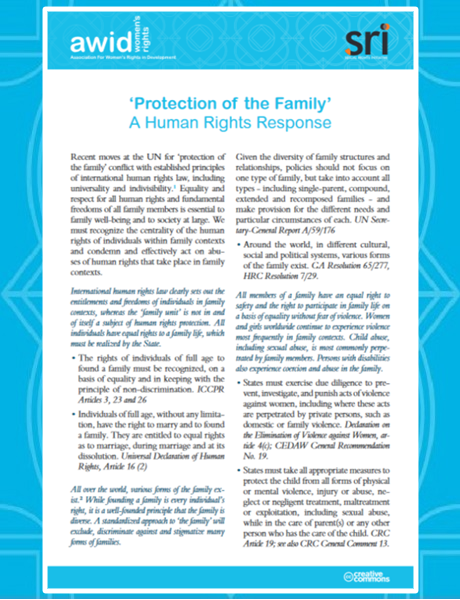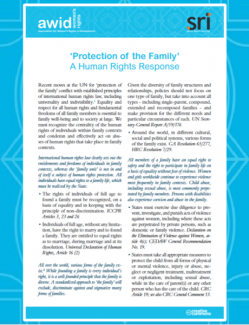Recent moves at the UN for ‘protection of the family’ conflict with established principles of international human rights law, including universality and indivisibility.

Equality and respect for all human rights and fundamental freedoms of all family members is essential to family well-being and to society at large. We must recognize the centrality of the human rights of individuals within family contexts and condemn and effectively act on abuses of human rights that take place in family contexts.
International human rights law clearly sets out the entitlements and freedoms of individuals in family contexts, whereas the ‘family unit’ is not in and of itself a subject of human rights protection. All individuals have equal rights to a family life, which must be realized by the State.
- The rights of individuals of full age to found a family must be recognized, on a basis of equality and in keeping with the principle of non-discrimination. ICCPR Articles 3, 23 and 26
- Individuals of full age, without any limitation, have the right to marry and to found a family. They are entitled to equal rights as to marriage, during marriage and at its dissolution. Universal Declaration of Human Rights, Article 16 (2)
All over the world, various forms of the family exist. While founding a family is every individual’s right, it is a well-founded principle that the family is diverse. A standardized approach to ‘the family’ will exclude, discriminate against and stigmatize many forms of families.
- Given the diversity of family structures and relationships, policies should not focus on one type of family, but take into account all types - including single-parent, compound, extended and recomposed families - and make provision for the different needs and particular circumstances of each. UN Secretary-General Report A/59/176
- Around the world, in different cultural, social and political systems, various forms of the family exist. GA Resolution 65/277, HRC Resolution 7/29.
All members of a family have an equal right to safety and the right to participate in family life on a basis of equality without fear of violence. Women and girls worldwide continue to experience violence most frequently in family contexts. Child abuse, including sexual abuse, is most commonly perpetrated by family members. Persons with disabilities also experience coercion and abuse in the family.
- States must exercise due diligence to prevent, investigate, and punish acts of violence against women, including where these acts are perpetrated by private persons, such as domestic or family violence. Declaration on the Elimination of Violence against Women, article 4(c); CEDAW General Recommendation No. 19.
- States must take all appropriate measures to protect the child from all forms of physical or mental violence, injury or abuse, neglect or negligent treatment, maltreatment or exploitation, including sexual abuse, while in the care of parent(s) or any other person who has the care of the child. CRC Article 19; see also CRC General Comment 13.
- States Parties must protect the child from all forms of sexual exploitation and sexual abuse. CRC Article 34.
- States must undertake to ensure the child protection and care necessary for his or her well-being. CRC Article 3.
Families must be free of coercion. All women and girls have the right not to be coerced into a family unit through forced marriage and all children have the right to protection from child and early marriage. Every individual must have the right to choose the kind of family they wish to be a part of and the way they enter into the family set up.
- No marriage shall be entered into without the free and full consent of the intending spouses, and on a basis of equality. ICCPR Article 23; CEDAW Article 16
- Child, early and forced marriage constitutes a violation of human rights, prevents individuals from living their lives free from violence, and has adverse consequences on the enjoyment of the right to education and to the highest attainable standard of health, including sexual and reproductive health. GA Resolution A/RES/69/156
Family members must not impose harmful and discriminatory practices on women and children. Families are made up of individuals, any of whom may hold biases that mirror harmful and/or life-threatening social stereotypes. All individuals have the right to be protected from harmful practices and families must not be treated differently from other social institutions or commit violations with impunity.
- States must fulfill their obligations to prevent, respond to and eliminate all harmful practices (such as FGM and dowry-related violence), wherever and in whichever form they occur, including within the family. CRC and CEDAW Joint General Recommendation (31) and General Comment (18)
- States should take all necessary measures, including enacting and enforcing legislation to prohibit FGM, protect girls and women from this form of violence, and end impunity. GA Resolution A/RES/67/146 and CSW 2008 Resolution 52/2
Individuals have the right to equality in family relations. The experiences of all women and girls in the family must align with universal principles of equality and justice.
- Whatever the form of the family, and whatever the legal system, religion, custom or tradition within the country in question, the treatment of women in the family must accord with principles of equality. CEDAW General Recommendation 21
- States shall take all appropriate measures to eliminate discrimination against women in all matters relating to family relations and shall ensure, on a basis of equality, the right to enter into marriage, to freely choose a spouse, the same rights during marriage and at its dissolution, and the same rights to decide freely and responsibly on the number and spacing of their children. CEDAW Article 16.
